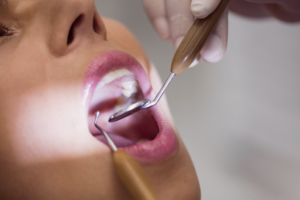An oral surgery biopsy is a medical procedure in which a sample of tissue is removed from the oral cavity for examination and diagnosis. This procedure is typically performed by oral and maxillofacial surgeons, periodontists, or other dental specialists. The purpose of an oral surgery biopsy is to investigate abnormal tissues, lesions, or growths in the mouth, helping to determine the nature of the tissue and whether it is benign or potentially malignant.
Here is an overview of the oral surgery biopsy process:
1. Indications for Oral Biopsy:
- Suspicious or abnormal oral lesions.
- Persistent ulcers, lumps, or growths.
- Unexplained discoloration or changes in the oral tissues.
- Evaluation of potentially cancerous or precancerous conditions.
2. Types of Oral Biopsies:
- Incisional Biopsy: A small portion of the suspicious tissue is removed for examination.
- Excisional Biopsy: The entire lesion or growth is removed if it is small enough for complete excision.
- Fine Needle Aspiration (FNA): A thin needle is used to extract cells from a lump or mass for examination.
3. Biopsy Procedure:
- Local Anesthesia: The patient is typically given local anesthesia to numb the area where the biopsy will be performed.
- Tissue Removal: Using specialized instruments, the surgeon carefully removes the targeted tissue sample.
- Hemostasis: Bleeding is controlled, and the wound may be closed with sutures if necessary.
4. Postoperative Care:
- Patients are provided with postoperative instructions, including information on pain management, oral hygiene, and dietary restrictions.
- Follow-up appointments are scheduled to monitor healing and discuss biopsy results.
5. Pathological Examination:
- The excised tissue is sent to a pathology laboratory for detailed examination by a pathologist.
- Microscopic analysis helps determine whether the tissue is benign, precancerous, or cancerous.
6. Biopsy Results:
- Results are typically communicated to the patient by the oral surgeon or referring dentist.
- Further treatment plans, if needed, are discussed based on the diagnosis.
Benefits of Oral Surgery Biopsy:
- Early detection and diagnosis of potentially serious oral conditions.
- Accurate identification of the nature of oral lesions.
- Informed treatment planning based on pathology results.
It’s crucial to note that the decision to perform an oral surgery biopsy is based on a thorough clinical examination and assessment of the patient’s medical and dental history. If there are any concerns about abnormalities in the oral tissues, a biopsy may be recommended to ensure a proper diagnosis and appropriate treatment planning.

